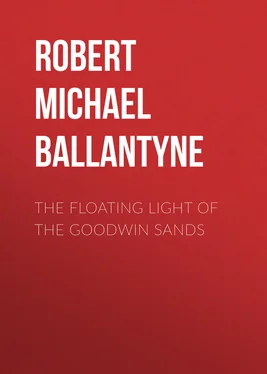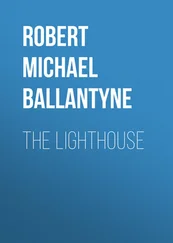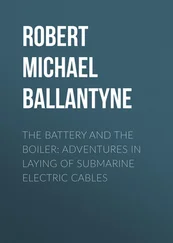Robert Michael Ballantyne - The Floating Light of the Goodwin Sands
Здесь есть возможность читать онлайн «Robert Michael Ballantyne - The Floating Light of the Goodwin Sands» — ознакомительный отрывок электронной книги совершенно бесплатно, а после прочтения отрывка купить полную версию. В некоторых случаях можно слушать аудио, скачать через торрент в формате fb2 и присутствует краткое содержание. Жанр: foreign_children, literature_19, foreign_antique, foreign_prose, на английском языке. Описание произведения, (предисловие) а так же отзывы посетителей доступны на портале библиотеки ЛибКат.
- Название:The Floating Light of the Goodwin Sands
- Автор:
- Жанр:
- Год:неизвестен
- ISBN:нет данных
- Рейтинг книги:4 / 5. Голосов: 1
-
Избранное:Добавить в избранное
- Отзывы:
-
Ваша оценка:
- 80
- 1
- 2
- 3
- 4
- 5
The Floating Light of the Goodwin Sands: краткое содержание, описание и аннотация
Предлагаем к чтению аннотацию, описание, краткое содержание или предисловие (зависит от того, что написал сам автор книги «The Floating Light of the Goodwin Sands»). Если вы не нашли необходимую информацию о книге — напишите в комментариях, мы постараемся отыскать её.
The Floating Light of the Goodwin Sands — читать онлайн ознакомительный отрывок
Ниже представлен текст книги, разбитый по страницам. Система сохранения места последней прочитанной страницы, позволяет с удобством читать онлайн бесплатно книгу «The Floating Light of the Goodwin Sands», без необходимости каждый раз заново искать на чём Вы остановились. Поставьте закладку, и сможете в любой момент перейти на страницу, на которой закончили чтение.
Интервал:
Закладка:
“Why blaze, ye bright benignant beaming star,
Guiding the homebound seaman from afar,
Lighting the outbound wand’rer on his way,
With all the lightsome perspicuity of day?
Why not go out at once! and let be hurl’d
Dark, dread, unmitigated darkness o’er the world?
Why should the heavenly constellations shine?
Why should the weather evermore be fine?
Why should this rolling ball go whirling round?
Why should the noise of mirth and music sound?
Why should the sparrow chirp, the blackbird sing,
The mountains echo, and the valleys ring,
With all that’s cheerful, humorous, and glad,
Now that my heart is smitten and my brain gone mad?”
Queeker fetched a long deep-drawn sigh at this point, the agony of intense composition being for a moment relaxed. Then, catching his breath and glaring, he went on in a somewhat gentler strain—
“Forgive me, Floating-light, and you, ye sun,
Moon, stars, and elements of Nature, every one;
I did but vent my misery and spleen
In utt’ring words of fury that I hardly mean.
At least I do in part—but hold! why not?
Oh! cease ye fiendish thoughts that rage and plot
To bring about my ruin. Hence! avaunt!
Or else in pity tell me what you want.
I cannot live, and yet I would not die!
My hopes are blighted! Where, oh whither shall I fly?
’Tis past! I’ll cease to daily with vain sophistry,
And try the virtue of a calm philosophy.”
The effect of composition upon Queeker was such that when he had completed his task he felt greatly tranquillised, and, having shut up his portfolio, formed the sudden resolution of dropping in upon the Durants to tea.
Meantime, and before the love-sick youth had begun the lines above quoted, Katie and her cousin walked home by a road which conducted them close past the edge of those extensive sandy plains called the Denes of Yarmouth. Here, at the corner of a quiet street, they were arrested by the sobbing of a little boy who sat on a railing by the roadside, swaying himself to and fro in an agony of grief.
Katie’s sympathetic heart was instantly touched. She at once went up to the boy, and made earnest inquiries into the cause of his distress.
“Please, ma’am,” said the boy, “I’ve lost a shillin’, and I can’t find it nowheres. Oh, wot ever shall I do? My mother gave it me to give with two other bobs to my poor sick brother whom I’ve comed all this way to see, and there I’ve gone an’ lost it, an’ I’ll ’ave to lay out all night in the cold, for I dursn’t go to see ’im without the money—boo, hoo!”
“Oh, how very unfortunate!” exclaimed Katie with real feeling for the boy, whose soul was thus steeped to all appearance in woe unutterable, was very small, and very dirty and ragged, and had an extremely handsome intelligent face, with a profusion of wild brown curls. “But I can make that up to you, poor boy,” she added, drawing out her purse, “here is a shilling for you. Where do you live?”
“At Ramsgate, ma’am.”
“At Ramsgate?” exclaimed Katie in surprise, “why, how did you manage to get here?”
“I come in a lugger, ma’am, as b’longs to a friend o’ ourn. We’ve just arrived, an’ we goes away agin to-morrow.”
“Indeed! That will give you little time to see your sick brother. What is the matter with him?”
“Oh, he’s took very bad, ma’am. I’m sorry to say he’s bad altogether, ma’am. Bin an’ run’d away from ’ome. A’most broke his mother’s ’eart, he has, an’ fall’d sick here, he did.”
The small boy paused abruptly at this point, and looked earnestly in Katie’s kind and pitiful face.
“Where does your brother live?” asked Katie.
The small boy looked rather perplexed, and said that he couldn’t rightly remember the name of the street, but that the owner of the lugger “know’d it.” Whereat Katie seemed disappointed, and said she would have been so glad to have visited him, and given him such little comforts as his disease might warrant.
“Oh, ma’am,” exclaimed the small boy, looking wistfully at her with his large blue eyes, “ wot a pity I’ve forgot it! The doctor ordered ’im wine too—it was as much as ’is life was worth not to ’ave wine,—but of course they couldn’t afford to git ’im wine—even cheap wine would do well enough, at two bob or one bob the bottle. If you was to give me two bob—shillins I mean, ma’am—I’d git it for ’im to-night.”
Katie and her cousin conversed aside in low tones for a minute or two as to the propriety of complying with this proposal, and came to the conclusion that the boy was such a nice outspoken honest-like fellow, that it would do no harm to risk that sum in the circumstances. Two shillings were therefore put into the boy’s dirty little hand, and he was earnestly cautioned to take care of it, which he earnestly, and no doubt honestly, promised to do.
“What is your name, boy?” asked Katie, as she was about to leave him.
“Billy—Billy Towler, ma’am,” answered the urchin, pulling his forelock by way of respectful acknowledgment, “but my friends they calls me Walleye, chiefly in consikence o’ my bein’ wery much the rewerse of blind, ma’am, and niver capable of bein’ cotched in a state o’ slumber at no time.”
This reply had the effect of slightly damaging the small boy’s character for simplicity in Katie’s mind, although it caused both herself and her companion to laugh.
“Well, Billy,” she said, opening her card-case, “here is my card—give it to your sick brother, and when he sends it to me with his address written on the back of it I’ll call on him.”
“Thankee, ma’am,” said the small boy.
After he had said this, he stood silently watching the retiring figure of his benefactress, until she was out of sight, and then dashing round the corner of a bye-street which was somewhat retired, he there went off into uncontrollable fits of laughter—slapped his small thighs, held his lean little sides with both hands, threw his ragged cap into the air, and in various other ways gave evidence of ecstatic delight. He was still engaged in these violent demonstrations of feeling when Morley Jones—having just landed at Yarmouth, and left the sloop Nora in charge of young Welton—came smartly round the corner, and, applying his heavy boot to the small boy’s person, kicked him into the middle of the road.
Chapter Six.
The Tempter and the Tempted
“What are ye howlin’ there for, an’ blockin’ up the Queen’s highway like that, you precious young villain?” demanded Morley Jones.
“An’ wot are you breakin’ the Queen’s laws for like that?” retorted Billy Towler, dancing into the middle of the road and revolving his small fists in pugilistic fashion. “You big hairy walrus, I don’t know whether to ’ave you up before the beaks for assault and battery or turn to an’ give ’ee a good lickin’.”
Mr Jones showed all his teeth with an approving grin, and the small boy grinned in return, but still kept on revolving his fists, and warning the walrus to “look hout and defend hisself if he didn’t want his daylights knocked out or his bows stove in!”
“You’re a smart youth, you are,” said Jones.
“Ha! you’re afraid, are you? an’ wants to make friends, but I won’t ’ave it at no price. Come on, will you?”
Jones, still grinning from ear to ear, made a rush at the urchin, who, however, evaded him with such ease that the man perceived he had not the smallest chance of catching him.
“I say, my lad,” he asked, stopping and becoming suddenly grave, “where d’you come from?”
“I comes from where I b’longs to, and where I’m agoin’ back to w’en it suits me.”
Читать дальшеИнтервал:
Закладка:
Похожие книги на «The Floating Light of the Goodwin Sands»
Представляем Вашему вниманию похожие книги на «The Floating Light of the Goodwin Sands» списком для выбора. Мы отобрали схожую по названию и смыслу литературу в надежде предоставить читателям больше вариантов отыскать новые, интересные, ещё непрочитанные произведения.
Обсуждение, отзывы о книге «The Floating Light of the Goodwin Sands» и просто собственные мнения читателей. Оставьте ваши комментарии, напишите, что Вы думаете о произведении, его смысле или главных героях. Укажите что конкретно понравилось, а что нет, и почему Вы так считаете.












